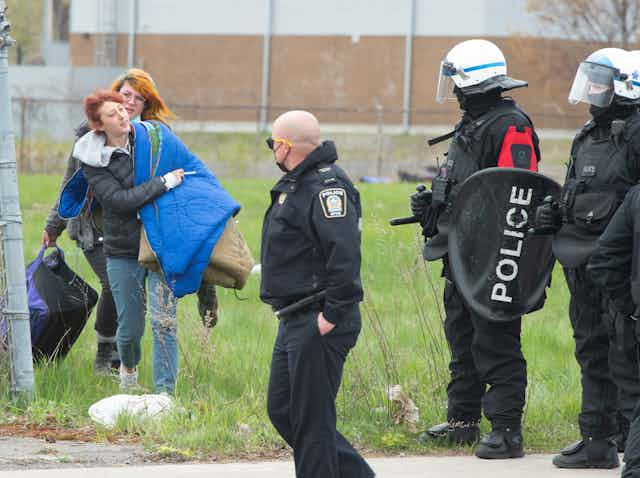Research conservatively estimates that 35,000 Canadians experience homelessness on any given night, with an average of one person sleeping outdoors for every five individuals staying in a shelter.
As those numbers continue to increase during the pandemic, there is a corresponding increase in policing of encampments at the municipal level. In the past month alone, there has been media coverage around ticketing to clear RV camps in Vancouver and the use of police officers to enforce camp evictions in both Montréal and Toronto.
As an occupational therapist with front-line experience working on a community mental health team in Toronto, I have witnessed peoples’ daily battles with discrimination, surveillance and policing. And my experiences have taught me that compassion in Canada often depends on who you are or how you are perceived.
For example, the Ontario Safe Streets Act is meant to keep citizens safe from “aggressive solicitation,” but in practice, enforcement of this act targets those who are visibly poor.
A woman I worked with was ticketed several times under this act. She was trying to stop engaging in sex work and was panhandling, thinking it could be a safer way to make money. She told me: “Police are here to keep people like you safe, not people like me.”
This is the reality for many Canadians experiencing poverty But, aren’t we all citizens, deserving of safety and protection?

Breaking the law and various kinds of enforcement
Joe Hermer, a sociologist at the University of Toronto, has spent his career studying the survival strategies and policing of vulnerable people. He is now leading a project called COVID-19 Policing and Homelessness Initiative to study how municipal bylaws, such as anti-loitering and anti-camping laws, work together to criminalize being homeless.
“A homeless person simply could not exist in public space without breaking one of these laws,” says Hermer. “Individual offences may seem harmless, but if you view how they are actively enforced, it actually ends up being like the old vagrancy laws.”
Historically, vagrancy laws made it a crime to be jobless or homeless. The laws were written in vague terms that allowed the state to regulate people based on their income level, sexual orientation and race. To this day, racialized communities are overrepresented among people experiencing homelessness in Canada due in part to compounding experiences of stigma and discrimination.
Preliminary findings from Hermer’s study show that 75 per cent of Canadians live in a jurisdiction with laws that he describes as “neo-vagrancy” laws. And these issues are not limited to large cities.
“It’s civil society enforcement, too, because (police are) responding to complaints,” says Patti Fairfield, executive director of Ne-Chee Friendship Centre in Kenora, Ont.
Fairfield says the people of Kenora will “open their wallets and give” to people in need, but there is still a pervasive not-in-my-backyard philosophy that drives people to complain about things such as seeing men from the local emergency shelter playing street hockey.
In Toronto, the city’s new Pathway Inside program has been criticized for keeping shelter hotel rooms empty for people living in four of the largest and most visible encampments, while people who want to be indoors are left waiting. People in the parks say the use of trespass notices and bylaw enforcement leaves them feeling vulnerable and threatened.
Keeping rooms empty
Ivan Drury, a political organizer in British Columbia and a member of the Red Braid Alliance for Decolonial Socialism, says the same strategy of keeping rooms empty exclusively for encampment residents is a longstanding practice of the B.C. government.
“Policing people out of (encampments) into a shelter is not about taking people off the street, because most people are not in camps. Most people are scattered into terrible congregate shelters, which in our moment of the pandemic are more unsafe than being outside.”
Social scientist Eric Weismann, who has lived experience of homelessness, says that people underestimate the mental-health impacts of being homeless. He describes the cruelty of the promise of support and housing that simply doesn’t exist or exists with a long waitlist, as well as the inability to feel safe due to the constant policing.
“You’re in survival, anxiety mode all the time,” he said. “It doesn’t mean you’re a bad person, making bad choices. It’s not like you can make good choices. Good choices (like being housed) are not there.”
Drawing from his own experiences couch surfing and living on the street, Weismann believes that “if we really want people to transcend these horrible encampment experiences, we need to support them, and organize them, and give people the safety and security to address their needs; to be able to sit back and not worry.”

Drury expresses concern that too much organizing in encampments could lead to more regulation and policing of the people staying in them. Advocating for better support in the encampments should not be about making encampments an “acceptable part of Canada’s housing continuum” but rather about making the camps as humane as possible until permanent housing options are in place.
Both Drury and Weismann agree that moving forward, a key component in any planning around encampments is the voice of people with lived experience. It is clear the go-to response of policing is not working.
“Sweeping campgrounds is worse than somebody needing to sleep in one,” says Weismann. “I don’t want people to have to stay in camps for very long, but when people do need to stay in camps, I want the camps they’re staying in to be supportive. The primary concern is for the people living in these places. Not the city. Not the neighbours.”

